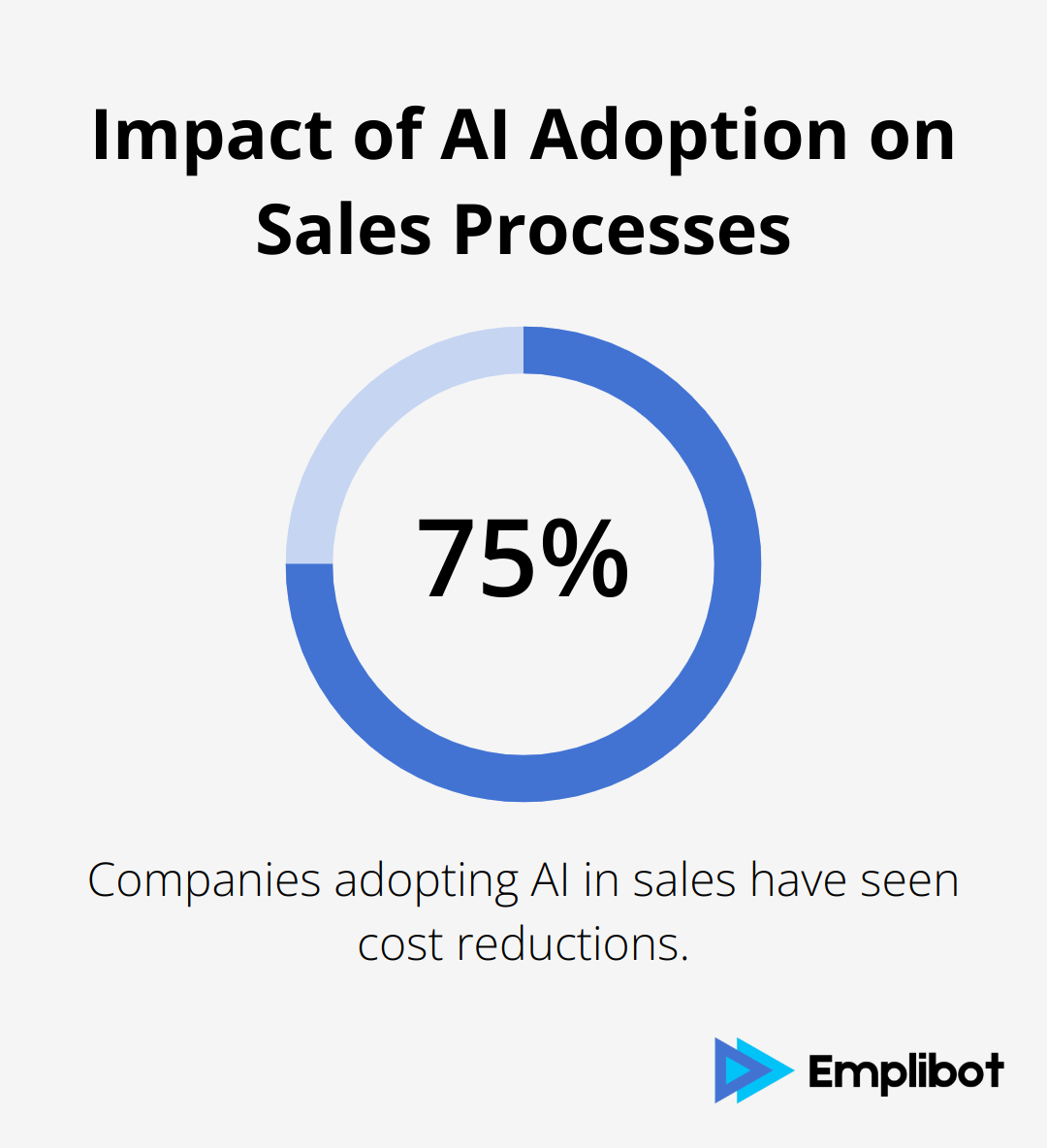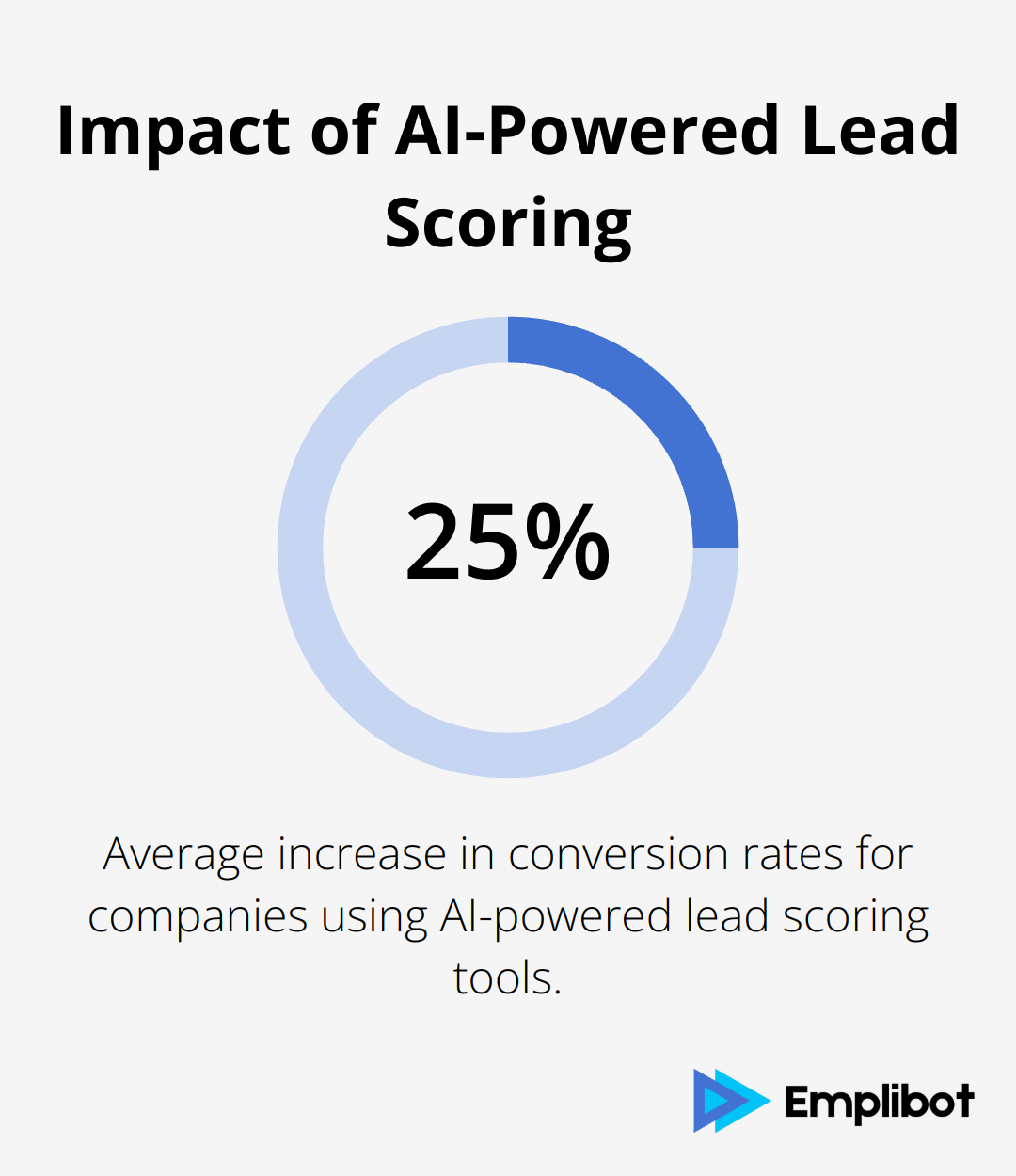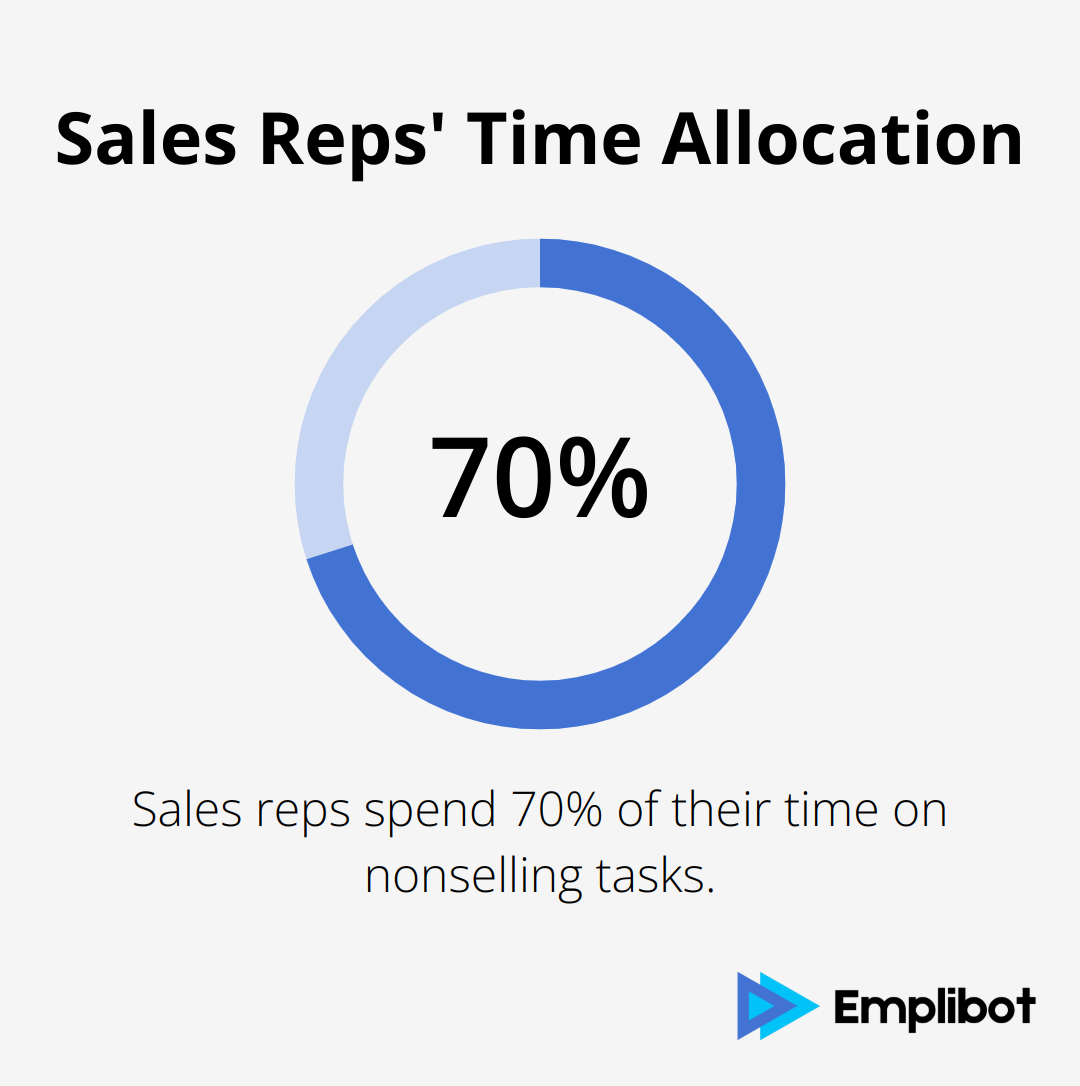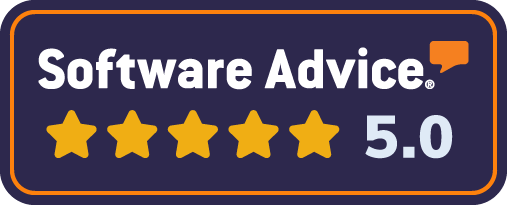AI-powered sales planning is revolutionizing how businesses approach their sales strategies. At Emplibot, we’ve seen firsthand how AI sales plan generators can transform the way companies forecast, prioritize leads, and optimize their sales processes.
This blog post will guide you through the essentials of creating an AI-powered sales plan, from understanding its key components to implementing it effectively in your organization.
Contents
ToggleWhat is AI-Powered Sales Planning?
Redefining Sales Strategies with AI
AI-powered sales planning transforms how businesses approach their sales strategies. It uses artificial intelligence to analyze vast amounts of data, predict trends, and make data-driven decisions that optimize the sales process.
The Impact of AI on Sales Performance
AI brings a new level of precision and efficiency to sales planning. A recent study by McKinsey reveals that companies adopting AI in their sales processes have seen cost reductions. This isn’t just about task automation; it’s about using AI to make smarter, more informed decisions.

AI can analyze historical sales data, market trends, and customer behavior to predict which leads will likely convert. This allows sales teams to focus their efforts where they’re most likely to pay off.
Key Components of an AI-Driven Sales Plan
An effective AI-driven sales plan typically includes several key components:
- Predictive Analytics: This involves using AI to forecast future sales trends and identify potential opportunities or risks. AI algorithms can analyze past sales data to predict which products will likely sell well in the coming months, allowing businesses to adjust their inventory and marketing strategies accordingly.
- Customer Segmentation: AI can categorize customers into distinct groups based on their behavior, preferences, and purchasing patterns. This enables more targeted and personalized sales approaches.
- Automated Lead Scoring: AI systems can evaluate leads based on multiple factors and assign scores, helping sales teams prioritize their efforts.
- Sales Process Optimization: AI can analyze each step of the sales process to identify bottlenecks and suggest improvements. It might recommend the best times to follow up with leads or the most effective communication channels for different customer segments.
The Future of AI in Sales Planning
As AI technology continues to advance, we can expect even more sophisticated applications in sales planning. Predictive analytics will become more accurate, lead scoring more nuanced, and customer segmentation more precise. Companies that embrace these AI-powered tools (like those offered by Emplibot) will be well-positioned to stay ahead of the competition and drive significant growth in their sales performance.
Now that we understand what AI-powered sales planning entails, let’s explore how to leverage specific AI tools to implement these strategies effectively.
How AI Tools Revolutionize Your Sales Planning
Precision Customer Segmentation
AI-powered customer segmentation transcends traditional demographics. It analyzes behavioral patterns, purchase history, and social media activity to group customers with similar characteristics. This granular segmentation enables hyper-targeted marketing campaigns and personalized sales approaches.
A B2B software company (not affiliated with Emplibot) used AI segmentation to identify customers most likely to upgrade their subscription. Their tailored outreach to this segment increased their upgrade rate by 28% in just three months.
Predictive Analytics for Sales Forecasting
Predictive analytics uses historical data and machine learning algorithms to forecast future sales trends. This approach doesn’t just project numbers; it uncovers the factors driving those numbers.
A retail chain implemented AI-driven sales forecasting and reduced inventory costs by 15%. The system accurately predicted seasonal demand fluctuations, allowing for more efficient stock management.
AI-Driven Lead Scoring and Prioritization
AI-driven lead scoring analyzes multiple data points to rank leads based on their likelihood to convert. This method goes beyond basic criteria like company size or industry. It considers factors such as recent website visits, content downloads, and specific pages a lead has viewed.
Companies that use AI-powered lead scoring tools see an average increase of 25% in conversion rates.

Sales Process Optimization
AI can analyze your entire sales funnel, identify bottlenecks, and suggest improvements. It can recommend the best times to follow up with leads, the most effective communication channels, and even predict which deals are most likely to close.
AI-powered sales forecasting tools can gain insights into your sales pipeline, predict closing dates, and optimize your sales strategy.
Choosing the Right AI Tools
While these AI tools offer immense potential, it’s essential to select the right ones for your specific needs. Factors to consider include:
- Your business size and industry
- Current sales processes and pain points
- Integration capabilities with existing systems
- Budget and resource constraints
(Emplibot offers a comprehensive suite of AI tools that can address many of these needs, but it’s important to evaluate all options carefully.)
The next section will guide you through the process of implementing an AI-powered sales plan in your organization, ensuring you make the most of these revolutionary tools.
How to Implement Your AI-Powered Sales Plan
Evaluate Your Current Sales Process
Start with a thorough analysis of your existing sales process. Identify pain points, bottlenecks, and areas where AI could make the most significant impact. For instance, if your team spends excessive time on lead qualification, AI-powered lead scoring could transform your efficiency.
A recent study by Salesforce found that sales reps spend 70% of their time on nonselling tasks. AI can help reclaim that lost time by automating routine tasks and providing actionable insights.

Choose the Right AI Tools
The selection of appropriate AI tools is vital. Consider your specific needs, budget, and existing tech stack. Look for solutions that integrate seamlessly with your current CRM and other sales tools.
For example, if you struggle with accurate sales forecasting, prioritize AI tools that excel in predictive analytics. If customer segmentation is your primary concern, focus on AI platforms with robust data analysis capabilities.
(While there are many options available, Emplibot offers a comprehensive suite of AI tools designed specifically for sales and marketing automation.)
Train Your Team
The introduction of AI into your sales process requires proper training. Your team needs to understand how to interpret AI-generated insights and incorporate them into their daily workflows.
According to a McKinsey report, companies that invest in AI training for their employees see a 50% higher success rate in AI adoption. Organize workshops, provide hands-on training sessions, and consider the appointment of AI champions within your team to support the transition.
Measure and Optimize Performance
Once your AI-powered sales plan is in action, continuous measurement and optimization become key. Set clear KPIs aligned with your business goals. These might include metrics like lead conversion rate, sales cycle length, or customer lifetime value.
Use AI analytics tools to track these metrics in real-time. Many AI platforms offer customizable dashboards that allow you to visualize your sales performance at a glance.
AI is not a set-it-and-forget-it solution. Regular reviews of your AI models’ performance and retraining with new data will ensure they remain accurate and effective.
Adapt and Evolve
The AI landscape evolves rapidly. Stay informed about new developments and trends in AI for sales. (Attend industry conferences, read relevant publications, and network with other professionals using AI in their sales processes.)
Try to foster a culture of continuous improvement within your team. Encourage feedback on the AI tools and processes, and be ready to make adjustments as needed. This adaptability will ensure your AI-powered sales plan remains effective and competitive in the long run.
Final Thoughts
AI-powered sales planning revolutionizes business strategies, offering unparalleled efficiency and personalization. Companies can enhance their sales performance and gain a competitive edge by utilizing AI tools for customer segmentation, predictive analytics, and lead scoring. The future of AI in sales promises even more sophisticated applications, with AI sales plan generators becoming increasingly accurate and accessible to businesses of all sizes.
To implement AI in your sales process, assess your current workflow and identify areas for improvement. Select AI tools that align with your needs and integrate well with existing systems. Train your team to effectively use these new tools and interpret AI-generated insights to maximize their potential.
At Emplibot, we recognize the transformative power of AI in sales and marketing. Our AI-powered content marketing solution can automate your WordPress blog and social media presence, allowing your sales team to focus on high-value activities. Take the first step today and set your company up for long-term success in the AI-driven sales landscape.





![Will AI Kill Blogging? [What You Need To Do Today]](https://wp.emplibot.com/wp-content/uploads/emplibot/ai-kills-blogging-1751008068-768x456.jpeg)




